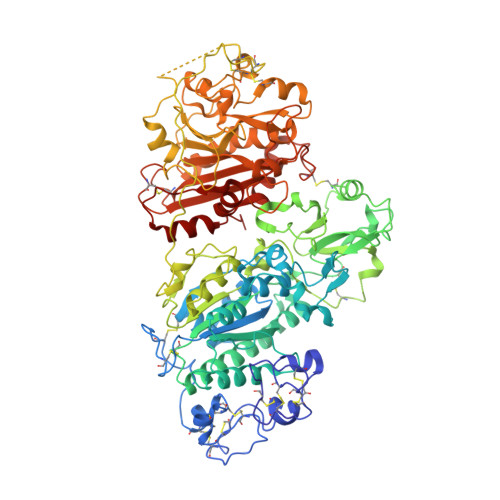Autotaxin facilitates selective LPA receptor signaling.
Salgado-Polo, F., Borza, R., Matsoukas, M.T., Marsais, F., Jagerschmidt, C., Waeckel, L., Moolenaar, W.H., Ford, P., Heckmann, B., Perrakis, A.(2023) Cell Chem Biol 30: 69-84.e14
- PubMed: 36640760
- DOI: https://doi.org/10.1016/j.chembiol.2022.12.006
- Primary Citation of Related Structures:
7Z3K, 7Z3L - PubMed Abstract:
Autotaxin (ATX; ENPP2) produces the lipid mediator lysophosphatidic acid (LPA) that signals through disparate EDG (LPA 1-3 ) and P2Y (LPA 4-6 ) G protein-coupled receptors. ATX/LPA promotes several (patho)physiological processes, including in pulmonary fibrosis, thus serving as an attractive drug target. However, it remains unclear if clinical outcome depends on how different types of ATX inhibitors modulate the ATX/LPA signaling axis. Here, we show that the ATX "tunnel" is crucial for conferring key aspects of ATX/LPA signaling and dictates cellular responses independent of ATX catalytic activity, with a preference for activation of P2Y LPA receptors. The efficacy of the ATX/LPA signaling responses are abrogated more efficiently by tunnel-binding inhibitors, such as ziritaxestat (GLPG1690), compared with inhibitors that exclusively target the active site, as shown in primary lung fibroblasts and a murine model of radiation-induced pulmonary fibrosis. Our results uncover a receptor-selective signaling mechanism for ATX, implying clinical benefit for tunnel-targeting ATX inhibitors.
- Division of Biochemistry, The Netherlands Cancer Institute, Amsterdam, Plesmanlaan 121, 1066 CX Amsterdam, the Netherlands; Oncode Institute, 3521 AL Utrecht, the Netherlands.
Organizational Affiliation:

























